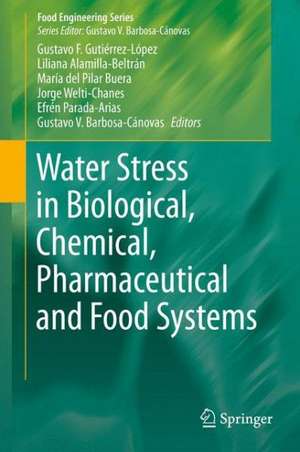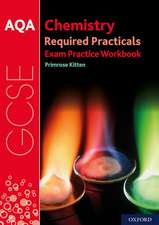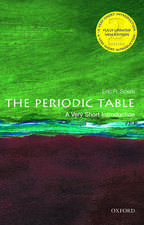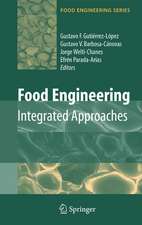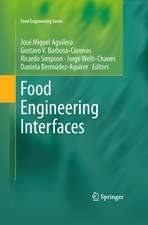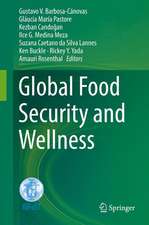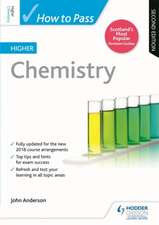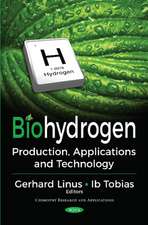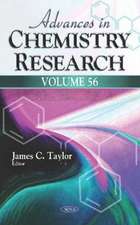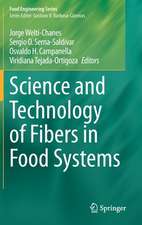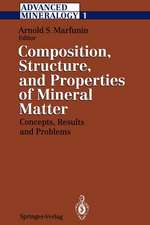Water Stress in Biological, Chemical, Pharmaceutical and Food Systems: Food Engineering Series
Editat de Gustavo F. Gutiérrez-López, Liliana Alamilla-Beltrán, María del Pilar Buera, Jorge Welti-Chanes, Efrén Parada-Arias, Gustavo V. Barbosa-Cánovasen Limba Engleză Hardback – 25 iul 2015
ISOPOW is a non-profit scientific organization whose activities aim at progressing the understanding of the properties of water in food and related biological systems and the exploitation of this understanding in improved raw materials, products and processes in the food, agro food or related industries. The first Symposium was organized in Glasgow, Scotland in 1974. Since then, ISOPOW meetings have promoted the exchange of knowledge between scientists involved in the study of food materials and scientists interested in water from a more basic point of view and the dialogue between academic and industrial scientists/technologists.
Din seria Food Engineering Series
- 15%
 Preț: 642.51 lei
Preț: 642.51 lei - 15%
 Preț: 647.92 lei
Preț: 647.92 lei - 23%
 Preț: 856.71 lei
Preț: 856.71 lei - 15%
 Preț: 647.40 lei
Preț: 647.40 lei - 15%
 Preț: 646.30 lei
Preț: 646.30 lei -
 Preț: 384.86 lei
Preț: 384.86 lei - 18%
 Preț: 966.78 lei
Preț: 966.78 lei - 18%
 Preț: 1236.38 lei
Preț: 1236.38 lei - 15%
 Preț: 656.74 lei
Preț: 656.74 lei - 15%
 Preț: 653.33 lei
Preț: 653.33 lei - 18%
 Preț: 951.59 lei
Preț: 951.59 lei - 18%
 Preț: 944.99 lei
Preț: 944.99 lei - 15%
 Preț: 716.15 lei
Preț: 716.15 lei - 18%
 Preț: 1232.57 lei
Preț: 1232.57 lei - 15%
 Preț: 647.92 lei
Preț: 647.92 lei - 15%
 Preț: 587.85 lei
Preț: 587.85 lei - 18%
 Preț: 1222.80 lei
Preț: 1222.80 lei - 18%
 Preț: 952.09 lei
Preț: 952.09 lei - 18%
 Preț: 1398.31 lei
Preț: 1398.31 lei -
 Preț: 399.12 lei
Preț: 399.12 lei - 18%
 Preț: 954.14 lei
Preț: 954.14 lei - 15%
 Preț: 644.95 lei
Preț: 644.95 lei - 18%
 Preț: 968.65 lei
Preț: 968.65 lei - 15%
 Preț: 638.89 lei
Preț: 638.89 lei - 18%
 Preț: 962.49 lei
Preț: 962.49 lei - 18%
 Preț: 1008.25 lei
Preț: 1008.25 lei - 18%
 Preț: 1225.79 lei
Preț: 1225.79 lei - 18%
 Preț: 961.41 lei
Preț: 961.41 lei - 18%
 Preț: 1378.86 lei
Preț: 1378.86 lei - 18%
 Preț: 961.72 lei
Preț: 961.72 lei -
 Preț: 489.30 lei
Preț: 489.30 lei - 18%
 Preț: 1388.05 lei
Preț: 1388.05 lei - 18%
 Preț: 1235.08 lei
Preț: 1235.08 lei - 15%
 Preț: 643.34 lei
Preț: 643.34 lei - 18%
 Preț: 2109.71 lei
Preț: 2109.71 lei - 18%
 Preț: 1815.87 lei
Preț: 1815.87 lei - 15%
 Preț: 644.95 lei
Preț: 644.95 lei - 18%
 Preț: 957.32 lei
Preț: 957.32 lei - 18%
 Preț: 973.06 lei
Preț: 973.06 lei
Preț: 980.95 lei
Preț vechi: 1196.29 lei
-18% Nou
Puncte Express: 1471
Preț estimativ în valută:
187.71€ • 200.72$ • 156.50£
187.71€ • 200.72$ • 156.50£
Carte disponibilă
Livrare economică 27 martie-10 aprilie
Preluare comenzi: 021 569.72.76
Specificații
ISBN-13: 9781493925773
ISBN-10: 1493925776
Pagini: 450
Ilustrații: XXX, 667 p. 240 illus., 79 illus. in color.
Dimensiuni: 155 x 235 x 38 mm
Greutate: 1.47 kg
Ediția:1st ed. 2015
Editura: Springer
Colecția Springer
Seria Food Engineering Series
Locul publicării:New York, NY, United States
ISBN-10: 1493925776
Pagini: 450
Ilustrații: XXX, 667 p. 240 illus., 79 illus. in color.
Dimensiuni: 155 x 235 x 38 mm
Greutate: 1.47 kg
Ediția:1st ed. 2015
Editura: Springer
Colecția Springer
Seria Food Engineering Series
Locul publicării:New York, NY, United States
Public țintă
ResearchCuprins
The state of water and its impact on pharmaceutical systems: lipid-based drug delivery systems and amorphous solids.- Food preservation by nano-structures- water interactions control.- Water and food appearance.- Maillard reaction in limited moisture and low water activity environment.- Carbohydrates and proteins as non-equilibrium components of biological materials.- Low-temperature mobility of water in sugar glasses: insights from thermally stimulated current study.- Functional behavior of different food components as affected by water and physical state.- Effect of different components of edible/biodegradable composite films on water-relationships in the polymer matrix.- Glass transition observed with cross-linked dextrans containing a small amount of water.- Sensorially and instrumentally detected antiplastizicing effect of water in corn flakes.- Characterization of a hydrate-dehydrate system with critical transitions in the typical range of processing and storage conditions.- Visco-elastic sorption behaviour of starch and gluten.- Molecular weight effects on enthalpy relaxation and fragility of amorphous carbohydrates.- Effect of dehydration conditions on the bulk and surface properties of the resulting dehydrated products.- Moisture sorption isotherms of foods: experimental methodology, mathematical analysis and practical applications.- Understanding cryopreservation of oyster oocytes from a physical chemistry perspective.- The role of water in the cryopreservation of seeds.- Water activity and microorganism control: past and future.- On modeling the effect of water activity on microbial growth and mortality kinetics.- Importance of halophilic and halotolerant lactic acid bacteria in cheeses.- Influence of water activity and molecular mobility on peroxidase activity in solution.- Phase transitions in sugars and protein systems: study of stability of lysozyme in amorphous sugar matrices.- An exhaustive study about physicochemical and structural changes during drying of apple discs.- Defining high and low spray drying temperatures for aloe vera gel.- Mexican plum (spondias purpurea l.) Moisture sorption properties.- Antioxidant activity of microencapsulated capsicum annuum oily extract obtained by spray drying.- Physical-chemical properties and microstructure of agave powders obtained by spray drying.- Stabilization and controlled release of invertase through the addition of trehalose in wet and dried alginate-chitosan beads.- Rheology and stability of citral/sugar microemulsions.- Response surface methodology to assay the effect of the addition of proteins and hydrocolloids on the water mobility of gluten free pasta formulations.- Effects of aw reduction and type of sugar in rheological behavior, water mobility and structural changes in apples.- Effect of water content on thermo-physical properties and freezing times of foods.- Effect of water content on thermo-physical properties and freezing times of foods.- Freezing rate effect on thermal transition of blueberries.- Glass transition temperature of some thai fruits using differential scanning calorimetry: influence of annealing and sugar composition.- Effect of emulsifier on complex formation and in vitro digestibility of gelatinized potato starch.- Influence of alcohols and polyols on the behavior of aqueous solutions of ctoglobulin at ph 5.5.- Effects of protein conformational modifications, enthalpy relaxation and interaction with water on the solubility of milk protein concentrate powder.- Active edible films based on modified corn starch for food applications.- Influence of moisture content and temperature on the stability of a dehydrated probiotic dairy product containing bifidobacterium infantis or lactobacillus acidophilus.- Effect of relative humidity on shrinkage and color changes in dehydrated strawberry.- Effect of blanching and/or osmotic dehydration on texture and rheological properties of apple tissue.- Water activity depression of tejocote fruit (crataegus pubescens) using osmotic solutions and pressure gradients.- Prediction approach to the glass transition temperature of amorphous carbohydrate polymer.- Effect of sugars on the release of aroma compounds in model systems.- Wetting behavior of chitosan solutions on blueberry epicarp with or without epicuticular waxes.- Influence of brine concentration on moisture and nacl transport during meat salting.- Relationship between electrical conductivity and water activity of starch: water composites.- Water content, aw and enzyme activity (xaa-prolyl dipeptidyl aminopeptidase) during the germination process of cocoa beans (theobroma cacao l.).- Water fraction effect in the rheological behavior of jalapeño pepper pulp.- Calorimetric and thermogravimetric analysis of agave tequilana weber fibers.- Study of allspice fluidized bed drying (pimenta dioica l. Merril) by biochemical and structural analysis.- Refined hemisphaericin stabilization by microencapsulation with Arabic gum and spray drying.- Water antiplasticization effect in biscuits as affected by glucose and sucrose addition.- Physicochemical characterization of regional breads produced in the northern mountains of Puebla State, Mexico.- Structural relaxation of salmon gelatin films in the glassy state.- Relationship between raw material characteristics and dehydration parameters of vegetables dried using a new kind of solar dryer.- Caking process and microstructural changes of wall materials used in spray-drying process.- Food matrix-structure quality preservation: water removal operation conditions control during convective drying.
Notă biografică
Gustavo F. Gutiérrez-López, received his Bachelor of Science in Biochemical Engineering and Master of Science in Food Science and Technology from the Instituto Politécnico Nacional, Mexico and his Master of Science in Food Process Engineering and Ph.D. in Food Engineering from the University of Reading, U.K. He is currently a Professor of Food Engineering and chair of the Ph.D. program in Food Science and Technology at the Escuela Nacional de Ciencias Biológicas of the Instituto Politécnico Nacional, México.
Liliana Alamilla-Beltrán, received her Bachelor of Science in Biochemical Engineering from the Instituto Tecnológico de la Paz, México and her Master of Science and PhD in Food Science from the Instituto Politécnico Nacional, México. She is currently a Professor of Food at the Escuela Nacional de Ciencias Biológicas of the Instituto Politécnico Nacional, México.
María del Pilar Buera received her Bachelor of Science in Chemical Sciences from Facultad de Ciencias Exactas y Naturales, Universidad de Buenos Aires (FCEN-UBA), Master of Science in Food Science and Technology from Universidad Nacional de Mar del Plata, Argentina and her PhD in Chemical Sciences from FCEN-UBA, where she is currently Titular Professor and develops activities as main researcher of CONICET, Argentina.
Jorge Welti-Chanes, received his bachelor of science in Biochemical Engineering and Master of Scienc
e in Food Engineering from the Tecnológico de Monterrey, Mexico and Ph.D. in Chemistry from the University of Valencia, Spain. He is currently Associate Dean at Tecnológico de Monterrey (National School of Engineering and Sciences), México and distinguished Visiting Professor at Texas Christian University and at the Escuela Nacional de Ciencias Biológicas of the Instituto Politécnico Nacional, México.Efrén Parada-Arias, received his Bachelor of Science in Biochemical Engineering and Master of Science in Food Science and Technology from the Instituto Politécnico Nacional, Mexico and his Ph. D. in Food Technology from the Polytechnic University of Valencia, Spain. He has been a Professor of Food Science and Food Engineering at the Escuela Nacional de Ciencias Biológicas, of the Instituto Politécnico Nacional, México and Secretary General of this institute, Director General at Instituto Mexicano del Petróleo and is currently Director General of Centros de Formación para el Trabajo, Secretaría de Educación Pública, México.
Gustavo V. Barbosa-Cánovas, a Fulbright Scholar, received his BS in Mechanical Engineering at University of Uruguay; MS and PhD at University of Massachusetts. He also received a Honoris Causa Doctorate from Polytechnic University of Cartagena, Spain. He is a Professor of Food Engineering and Director of the Center for Nonthermal Processing of Food at Washin
gton State University.
Liliana Alamilla-Beltrán, received her Bachelor of Science in Biochemical Engineering from the Instituto Tecnológico de la Paz, México and her Master of Science and PhD in Food Science from the Instituto Politécnico Nacional, México. She is currently a Professor of Food at the Escuela Nacional de Ciencias Biológicas of the Instituto Politécnico Nacional, México.
María del Pilar Buera received her Bachelor of Science in Chemical Sciences from Facultad de Ciencias Exactas y Naturales, Universidad de Buenos Aires (FCEN-UBA), Master of Science in Food Science and Technology from Universidad Nacional de Mar del Plata, Argentina and her PhD in Chemical Sciences from FCEN-UBA, where she is currently Titular Professor and develops activities as main researcher of CONICET, Argentina.
Jorge Welti-Chanes, received his bachelor of science in Biochemical Engineering and Master of Scienc
e in Food Engineering from the Tecnológico de Monterrey, Mexico and Ph.D. in Chemistry from the University of Valencia, Spain. He is currently Associate Dean at Tecnológico de Monterrey (National School of Engineering and Sciences), México and distinguished Visiting Professor at Texas Christian University and at the Escuela Nacional de Ciencias Biológicas of the Instituto Politécnico Nacional, México.Efrén Parada-Arias, received his Bachelor of Science in Biochemical Engineering and Master of Science in Food Science and Technology from the Instituto Politécnico Nacional, Mexico and his Ph. D. in Food Technology from the Polytechnic University of Valencia, Spain. He has been a Professor of Food Science and Food Engineering at the Escuela Nacional de Ciencias Biológicas, of the Instituto Politécnico Nacional, México and Secretary General of this institute, Director General at Instituto Mexicano del Petróleo and is currently Director General of Centros de Formación para el Trabajo, Secretaría de Educación Pública, México.
Gustavo V. Barbosa-Cánovas, a Fulbright Scholar, received his BS in Mechanical Engineering at University of Uruguay; MS and PhD at University of Massachusetts. He also received a Honoris Causa Doctorate from Polytechnic University of Cartagena, Spain. He is a Professor of Food Engineering and Director of the Center for Nonthermal Processing of Food at Washin
gton State University.
Textul de pe ultima copertă
Water Stress Management contains the invited lectures and selected oral and poster presentations of the 11th International Symposium on the Properties of Water (ISOPOW), which was held in Queretaro, Mexico 5-9 September 2010. The text provides a holistic description and discussion of state-of-the-art topics on the role of water in Biological, Chemical, Pharmaceutical, and Food systems within a frame of an integrated approach and future trends on the subject. Different points-of-view about the state of water and phase transitions in a variety of substrates are presented.
ISOPOW is a non-profit scientific organization whose activities aim at progressing the understanding of the properties of water in food and related biological systems, and the exploitation of this understanding in improved raw materials, products and processes in the food, agrofood or related industries. The first Symposium was organized in Glasgow , Scotland in 1974. Since then, ISOPOW meetings have promoted the exchange of knowledge between scientists involved in the study of food materials and scientists interested in water from a more basic point of view and the dialogue between academic and industrial scientists/technologists.
ISOPOW is a non-profit scientific organization whose activities aim at progressing the understanding of the properties of water in food and related biological systems, and the exploitation of this understanding in improved raw materials, products and processes in the food, agrofood or related industries. The first Symposium was organized in Glasgow , Scotland in 1974. Since then, ISOPOW meetings have promoted the exchange of knowledge between scientists involved in the study of food materials and scientists interested in water from a more basic point of view and the dialogue between academic and industrial scientists/technologists.
Caracteristici
A holistic description of the role of water in the Biological, Chemical, Pharmaceutical and Food systems A discussion of state-of-the-art topics on the role of water in Biological, Chemical, Pharmaceuticals and Food Systems within a frame of an integrated approach and future trends on the subject High level chapters on different points-of-view about the state of water and phase transitions in a variety of substrates
